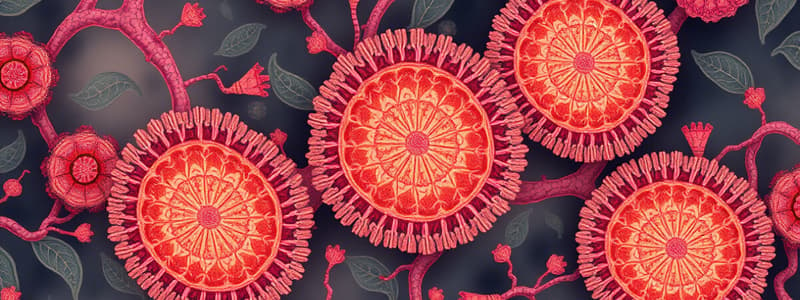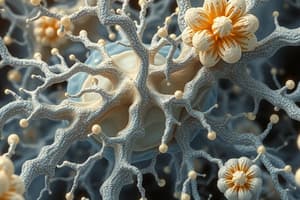Podcast
Questions and Answers
What is the importance of tissue in multicellular organisms? (Select all that apply)
What is the importance of tissue in multicellular organisms? (Select all that apply)
- Cells do not need to divide.
- Formation of tissues promotes division of labor. (correct)
- Improved organization increases survival. (correct)
- Tissues organize to form organs. (correct)
Name the three types of meristematic tissue.
Name the three types of meristematic tissue.
Apical meristem, Lateral meristem (cambium), Intercalary meristem.
What is a tissue?
What is a tissue?
A group of cells that are similar in structure and work together to achieve a particular function.
Which of the following is NOT a type of meristematic tissue?
Which of the following is NOT a type of meristematic tissue?
Permanent tissues can still divide.
Permanent tissues can still divide.
What is cell differentiation?
What is cell differentiation?
Which of the following is a characteristic of meristematic tissue?
Which of the following is a characteristic of meristematic tissue?
Which type of simple permanent tissue is the most common in plants?
Which type of simple permanent tissue is the most common in plants?
Which of the following are states of matter?
Which of the following are states of matter?
What is the definition of matter?
What is the definition of matter?
Plasma is a state of matter that exists at high temperatures.
Plasma is a state of matter that exists at high temperatures.
Match the state of matter with its characteristic:
Match the state of matter with its characteristic:
The phase change from solid to liquid is called ______.
The phase change from solid to liquid is called ______.
Increased ______ can cause gases to compress into liquids or solids.
Increased ______ can cause gases to compress into liquids or solids.
What is Bose-Einstein Condensate?
What is Bose-Einstein Condensate?
Sublimation is the phase change from gas to solid.
Sublimation is the phase change from gas to solid.
What are real-world examples of different states of matter?
What are real-world examples of different states of matter?
Flashcards are hidden until you start studying
Study Notes
Overview of Tissues
- Tissues are groups of similar cells that work together for specific functions in multicellular organisms, enabling division of labor.
- They arise from common parent cells and exhibit distinctive shapes, sizes, and arrangements.
Importance of Tissues
- Tissues facilitate the organization of cells into organs and organ systems, enhancing efficiency and survival.
- Division of labor among specialized tissues reduces the workload of individual cells.
Types of Tissues
- Two main categories: Plant Tissue and Animal Tissue.
Plant Tissue
- Meristematic Tissue:
- Composed of undifferentiated, actively dividing cells, crucial for plant growth.
- Found in regions such as root tips, shoot tips, and cambium; contributes to length and girth increase.
- Permanent Tissue:
- Derived from meristematic tissue through the process of differentiation into specialized cells.
Characteristics of Meristematic Tissue
- Actively dividing cells with abundant cytoplasm and a large nucleus.
- Compact arrangement with minimal intercellular space; thin cell walls.
- Can contain various shapes: spherical, oval, polygonal, or rectangular, and may or may not have vacuoles.
Functions of Meristematic Tissue
- Continuous division leading to the formation of new specialized cells.
- Increases plant length via root and shoot tips.
- Increases plant girth through lateral meristem (cambium).
Types of Meristematic Tissue
- Apical Meristem:
- Located at the apex of roots or stems, responsible for elongation.
- Lateral Meristem (Cambium):
- Found along the sides of stems and roots, facilitating thickness increase.
- Intercalary Meristem:
- Positioned at the base of leaves or between internodes, contributing to length growth.
Characteristics of Permanent Tissue
- Cells have lost the capacity to divide and have a fixed shape and size.
- They perform specific functions and can be either living or dead.
- Cell walls may vary in thickness; cells typically contain vacuolated cytoplasm.
Types of Permanent Tissue
- Simple Permanent Tissue:
- Composed of similar cell types; three main categories based on cell nature:
- Parenchyma:
- Fundamental tissue with commonality in structure; typically living and varies in shape.
- Parenchyma:
- Composed of similar cell types; three main categories based on cell nature:
- Other types to follow.
States of Matter
- Matter is anything that has mass and occupies space.
- The four fundamental states of matter are solid, liquid, gas, and plasma.
- Solids have a defined shape and volume due to tightly packed particles with strong intermolecular forces.
- Liquids have a defined volume but no fixed shape, taking the shape of their container. Particles are close together but can move past each other due to moderate intermolecular forces.
- Gases have no defined shape or volume, filling their container entirely. Particles are far apart and move freely, exhibiting weak intermolecular forces.
- Plasma is an ionized gas with free electrons and ions. It exists at high temperatures and conducts electricity. Fluorescent lights are an example of plasma.
- Bose-Einstein Condensate forms at extremely low temperatures, near absolute zero. Particles occupy the same quantum state, acting as a single entity.
- Fermionic Condensate is similar to Bose-Einstein but formed from fermions instead of bosons at extremely low temperatures.
- Quark-Gluon Plasma is a high-energy state of matter that exists at extremely high temperatures and densities.
- Melting is the transition of a solid to a liquid.
- Freezing is the transition of a liquid to a solid.
- Vaporization is the transition of a liquid to a gas, which includes boiling and evaporation.
- Condensation is the transition of a gas to a liquid.
- Sublimation is the transition of a solid directly to a gas, skipping the liquid phase.
- Deposition is the transition of a gas directly to a solid, skipping the liquid phase.
- Temperature affects the state of matter; higher temperatures increase kinetic energy, transitioning solids to liquids or gases.
- Pressure also affects the state of matter; increased pressure can compress gases into liquids or solids.
- Understanding the states of matter is crucial for various fields such as chemistry, physics, engineering, and environmental science.
Studying That Suits You
Use AI to generate personalized quizzes and flashcards to suit your learning preferences.




